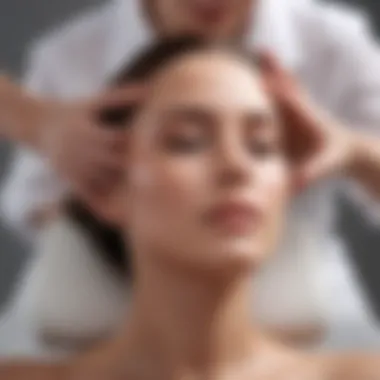Exploring Effective Treatment Approaches for Scalp Diseases: A Comprehensive Guide


Beauty Trends
Discover the latest trends in skincare targeting scalp health. The beauty industry is abuzz with innovative solutions for scalp diseases, from soothing tonics to specialized treatments. Explore detailed guides on scalp care routines, product reviews, and expert tips to achieve lustrous, healthy hair. Dive into a comprehensive analysis of scalp-focused beauty trends, offering women of all ages insights into maintaining optimal scalp health.
Understanding Scalp Conditions
Begin by delving into the diverse range of scalp diseases that afflict individuals worldwide. From dandruff to alopecia, each condition presents unique challenges requiring tailored treatment strategies. Unlock the complexities of scalp diseases to comprehend the underlying causes and manifestations, setting the foundation for effective treatment approaches.
Topical Solutions and Home Remedies
Embark on a journey through the realm of topical solutions and home remedies, where nature's offerings hold promise for scalp health. Explore the benefits of natural oils like coconut oil and tea tree oil in nourishing the scalp and combating various conditions. Unveil the power of homemade hair masks and herbal infusions as effective alternatives to commercial products, resonating with individuals seeking organic remedies for scalp diseases.
Professional Interventions and Medical Treatments
Transition into the realm of professional interventions and medical treatments designed to address complex scalp diseases. From dermatological consultations to advanced therapies like laser treatment and PRP (platelet-rich plasma) therapy, explore the frontiers of modern medicine in scalp health. Discover how targeted medications and clinical procedures offer hope to those grappling with severe scalp conditions, ushering in a new era of treatment efficacy.
Holistic Approaches and Lifestyle Modifications
Delve into holistic approaches and lifestyle modifications that play a pivotal role in promoting scalp health. Uncover the intricate connection between diet, stress levels, and scalp conditions, emphasizing the importance of a balanced lifestyle. Explore the benefits of mindfulness practices, stress-reducing techniques, and dietary adjustments in nurturing scalp wellness, empowering individuals to take charge of their holistic well-being.
Synthesizing Information and Future Outlook
Understanding Scalp Diseases
In this article, delving into the realm of scalp diseases is crucial to comprehensively understand the various treatment approaches available in the field. By grasping the nuances of scalp diseases, readers can navigate through the maze of remedies with more clarity. Understanding scalp diseases offers a foundation for exploring effective treatment methods, providing a roadmap for individuals seeking to address diverse scalp conditions. This section serves as a cornerstone for the subsequent discussions on treatment modalities, shedding light on the intricacies of scalp health.
Overview of Scalp Diseases
Common Types of Scalp Diseases
Discussing common types of scalp diseases is pivotal in establishing a robust understanding of the prevalent issues individuals encounter. From conditions like dandruff to more severe ailments such as alopecia, each type presents unique challenges that necessitate tailored treatments. Highlighting the symptoms and characteristics of these common scalp diseases helps readers identify potential issues they may be facing. By illuminating key information about these diseases, individuals can make informed decisions regarding their scalp health, emphasizing the significance of early detection and management.
Causes and Symptoms
Exploring the causes and symptoms of scalp diseases provides essential insights into the underlying factors contributing to these conditions. Understanding the root causes enables individuals to adopt preventive measures and mitigate risks associated with specific diseases. By recognizing the symptoms early on, individuals can seek timely medical intervention, enhancing the effectiveness of treatment outcomes. This section underscores the importance of identifying causes and symptoms as a proactive approach to maintaining scalp health, underscoring the crucial role these factors play in diagnosis and management.
Diagnosis Methods


Physical Examination
Conducting a thorough physical examination is a fundamental diagnostic method in evaluating scalp diseases. From inspecting the scalp for irregularities to assessing hair quality and texture, a physical examination offers valuable insights into the overall health of the scalp. By delving into the details revealed during a physical examination, healthcare providers can formulate targeted treatment plans tailored to the individual's specific condition. This method not only aids in diagnosis but also serves as a baseline for monitoring the progression of scalp diseases, emphasizing its significance in clinical practice.
Biopsy Procedures
Biopsy procedures play a critical role in determining the precise nature of scalp diseases through tissue analysis. By obtaining a sample from the scalp and examining it under a microscope, healthcare providers can identify specific conditions with accuracy. The detailed information garnered from biopsy procedures guides treatment decisions, ensuring the most appropriate interventions are implemented. While invasive, biopsy procedures offer valuable diagnostic data that enhance the overall management of scalp diseases, underscoring their importance in confirming clinical suspicions and refining treatment strategies.
Topical Treatments
Topical treatments play a crucial role in the comprehensive treatment of scalp diseases. They are an essential component in addressing various scalp conditions effectively. In this article, we delve into the significance of utilizing topical treatments to combat scalp diseases. These treatments offer a direct and targeted approach to manage specific scalp issues, providing relief and promoting scalp health. By focusing on the application of medications directly to the affected areas, topical treatments ensure a more concentrated and localized treatment, which can be advantageous in addressing scalp conditions efficiently.
Antifungal Shampoos
Antifungal shampoos are a key topical treatment method for scalp fungal infections. They are specifically formulated to target and eliminate the fungus causing the infection on the scalp. The role of antifungal shampoos in treating scalp fungal infections is paramount due to their ability to cleanse the scalp, reduce fungal growth, and alleviate associated symptoms. These shampoos contain active ingredients that have antifungal properties, effectively combating the underlying cause of the infection. The unique feature of antifungal shampoos lies in their direct application to the scalp, allowing for thorough cleansing and treatment of the affected areas. While antifungal shampoos can effectively address fungal infections, they may have certain limitations, such as requiring consistent usage to maintain effectiveness.
Effective Ingredients
Effective ingredients in antifungal shampoos play a critical role in their ability to combat scalp fungal infections. Ingredients such as ketoconazole, selenium sulfide, and pyrithione zinc are commonly found in antifungal shampoos and exhibit strong antifungal properties. These ingredients target the fungus causing the infection, effectively eradicating it and preventing its recurrence. The key characteristic of these effective ingredients is their ability to specifically target fungal growth on the scalp while maintaining the scalp's health. Incorporating these ingredients in antifungal shampoos ensures a potent and targeted treatment approach. While effective ingredients provide significant benefits in treating scalp fungal infections, individuals may experience varying results based on their scalp condition and the specific formulation of the shampoo.
Medicated Creams and Lotions
Medicated creams and lotions serve as another essential topical treatment option for scalp diseases. They offer a different approach to treating scalp conditions, providing a nourishing and protective layer over the affected areas. Application techniques for medicated creams and lotions involve evenly spreading the product on the scalp, ensuring comprehensive coverage for optimal results. The application techniques aim to deliver the active ingredients in the cream or lotion directly to the scalp, enhancing their efficacy in treating the underlying condition.
Key Components
The key components present in medicated creams and lotions are fundamental to their therapeutic effects on scalp diseases. Ingredients such as corticosteroids, salicylic acid, and coal tar are commonly found in these products, each offering unique benefits in combating scalp conditions. Corticosteroids help reduce inflammation and itching, providing relief for various scalp disorders. Salicylic acid aids in exfoliating the scalp, removing dead skin cells and promoting a healthy scalp environment. Coal tar helps in slowing down the rapid growth of skin cells on the scalp, which is beneficial for conditions like psoriasis. The key components in medicated creams and lotions target specific scalp concerns, addressing them effectively for improved scalp health.
Systemic Therapies
Systemic therapies play a crucial role in the comprehensive treatment approach recommended for scalp diseases. By addressing the root causes internally, these therapies offer a holistic method of combating various scalp conditions effectively. One essential aspect of systemic therapies is their ability to treat scalp diseases from within, targeting issues that topical treatments may not reach. This in-depth section will discuss the different systemic treatment options available and their benefits and considerations in detail.
Oral Medications
Prescription Drugs
Prescription drugs hold a pivotal position in the realm of systemic therapies for scalp diseases. These medications are specifically formulated to address the underlying causes of scalp conditions and provide targeted relief. One key characteristic of prescription drugs is their potency and efficacy in combating severe scalp issues. They are often considered a preferred choice due to their direct impact on disease processes, offering a potent solution for managing complex conditions. The unique feature of prescription drugs lies in their ability to be tailored to individual requirements, ensuring personalized treatment strategies for optimal results. While their effectiveness is undeniable, prescription drugs may also carry certain disadvantages such as potential side effects or the need for regular monitoring.
Usage Guidelines


Usage guidelines are essential components of oral medications in treating scalp diseases. These instructions outline the proper administration, dosage, and duration of the prescribed medications. One notable characteristic of usage guidelines is their role in ensuring the effectiveness and safety of oral treatments. By following these guidelines diligently, patients can maximize the therapeutic benefits of the medications while minimizing any potential risks. The unique feature of usage guidelines lies in their ability to provide structured protocols for patients to adhere to, promoting treatment adherence and positive outcomes. While these guidelines offer clear directions for medication use, they may also pose disadvantages such as strict requirements for compliance or potential restrictions on daily activities.
Injection Treatments
Corticosteroid Injections
Corticosteroid injections are a targeted approach to addressing stubborn scalp conditions. These injections deliver potent anti-inflammatory medication directly to affected areas, reducing inflammation and promoting healing. One key characteristic of corticosteroid injections is their rapid relief of symptoms, providing quick and effective solutions for conditions such as alopecia areata or psoriasis. Their popularity stems from the localized treatment they offer, targeting specific areas with precision for enhanced results. The unique feature of corticosteroid injections lies in their ability to deliver high concentrations of medication directly to the site of the problem, ensuring fast and concentrated action. While highly effective, corticosteroid injections may have downsides like potential skin atrophy or the need for multiple sessions for lasting effects.
Biologic Therapies
Biologic therapies represent a cutting-edge treatment option for scalp diseases, harnessing the power of biologically derived substances to modulate immune responses and control inflammation. One key characteristic of biologic therapies is their targeted approach to inhibiting specific immune pathways responsible for scalp conditions, offering a precision intervention with fewer systemic side effects. Their popularity in the field of dermatology is due to their ability to provide long-term remission for conditions like scalp psoriasis or eczema. The unique feature of biologic therapies lies in their specificity, targeting only the dysfunctional immune components while sparing the rest of the immune system. Despite their efficacy, biologic therapies may pose certain disadvantages like high cost or the need for regular monitoring for adverse effects.
Professional Interventions
Professional interventions play a pivotal role in the effective treatment of scalp diseases as they offer advanced solutions beyond topical treatments and home remedies. These interventions, conducted by trained professionals, encompass procedures like laser therapy and microneedling, targeting specific scalp conditions with precision and expertise. By opting for professional interventions, individuals can benefit from personalized treatment plans tailored to their unique scalp issues, ensuring optimal results and long-term scalp health.
Laser Therapy
Procedure Details
When delving into the specifics of laser therapy, it becomes apparent that this advanced treatment modality utilizes concentrated beams of light to target affected areas on the scalp. The procedure involves the precise delivery of laser energy to stimulate cell regeneration, reduce inflammation, and combat scalp infections effectively. Laser therapy stands out for its non-invasive nature, making it a sought-after option for individuals seeking gentle yet impactful solutions for scalp diseases. Additionally, the targeted approach of laser therapy minimizes damage to surrounding tissues, enhancing its safety profile and efficacy in addressing a spectrum of scalp conditions.
Benefits and Risks
Exploring the realm of benefits and risks associated with laser therapy underscores its significance in the realm of professional interventions for scalp diseases. The key benefit lies in the therapeutic effects of laser energy on scalp tissues, promoting hair growth, relieving itching, and rejuvenating the scalp environment. Moreover, laser therapy offers a non-pharmacological alternative, reducing the likelihood of side effects commonly linked to medications. However, like any treatment modality, laser therapy comes with potential risks such as skin irritation or slight discomfort during sessions. Despite these minor risks, the overall benefits of laser therapy in improving scalp health and treating diseases make it a valuable addition to the treatment arsenal for individuals seeking effective and safe solutions.
Microneedling
Mechanism of Action
A closer examination of microneedling reveals its innovative mechanism of action, which involves the use of fine, sterile needles to create microscopic punctures on the scalp's surface. This process stimulates collagen production, enhances blood circulation, and facilitates the absorption of topical treatments, optimizing their efficacy. Microneedling stands out for its ability to promote scalp rejuvenation and hair growth by encouraging cellular turnover and activating the body's natural healing processes. Additionally, the controlled nature of microneedling ensures minimal damage to the scalp, making it a popular choice for individuals seeking rejuvenation without extensive downtime.
Treatment Sessions
Understanding the dynamics of microneedling treatment sessions sheds light on its role in professional interventions for scalp diseases. Typically, microneedling sessions involve a series of treatments spaced at regular intervals to achieve cumulative benefits and promote long-lasting results. The frequency and duration of sessions are customized based on individual needs, with most individuals witnessing gradual improvements in scalp health and appearance over time. Despite its efficacy, microneedling may cause minor side effects like redness or mild swelling, which are transient and resolve quickly post-treatment. Overall, microneedling emerges as a versatile and effective professional intervention for scalp diseases, offering a gateway to enhanced scalp health and vitality.
Home Remedies and Lifestyle Changes
Home remedies and lifestyle changes play a crucial role in addressing scalp diseases. They offer a natural and gentle approach to combat scalp issues, focusing on nourishing the scalp and promoting overall hair health. These remedies can be easily incorporated into daily routines, providing a sustainable and holistic way to manage scalp conditions. By adopting lifestyle changes such as stress management and a balanced diet, individuals can support the effectiveness of home remedies, creating a comprehensive approach to scalp health.


Natural Remedies
Apple Cider Vinegar Rinse
Apple Cider Vinegar Rinse is a popular natural remedy known for its p H-balancing properties. It helps restore the scalp's natural acidity, which can aid in treating dandruff and maintaining a healthy scalp environment. The key characteristic of Apple Cider Vinegar Rinse lies in its ability to soothe itching and irritation, making it a preferred choice for individuals seeking relief from scalp ailments. While it offers valuable benefits for scalp health, it is essential to dilute the vinegar to prevent skin irritation.
Aloe Vera Applications
Aloe Vera Applications are renowned for their soothing and moisturizing properties, making them ideal for scalp care. Aloe Vera contains enzymes that promote hair growth and soothe scalp inflammation, contributing to overall scalp health. The key characteristic of Aloe Vera lies in its hydrating effects on the scalp, which can help improve conditions like dryness and itchiness. However, some individuals may be sensitive to Aloe Vera, necessitating a patch test before widespread application to avoid adverse reactions.
Dietary Adjustments
Diet plays a significant role in scalp health, with nutrition directly impacting the condition of the scalp. Ensuring a well-rounded diet rich in essential nutrients can promote hair growth and strengthen the hair follicles. The Impact of Nutrition on Scalp Health is substantial, with vitamins like Biotin and minerals like Zinc playing a vital role in maintaining healthy hair. By understanding the importance of nutrition, individuals can make informed choices about their diet to support optimal scalp health.
Foods to Include and Avoid
The choice of foods can greatly influence scalp health and overall hair condition. Including foods rich in Omega-3 fatty acids, like salmon and walnuts, can promote scalp hydration and reduce inflammation. Conversely, avoiding excessive consumption of processed foods and sugars can benefit scalp health by reducing inflammation and improving blood circulation. Making conscious decisions about food intake is key to supporting scalp health and addressing underlying issues that may contribute to scalp diseases.
Follow-up Care and Maintenance
In the realm of scalp disease management, follow-up care and maintenance play a pivotal role in ensuring long-term scalp health and treatment effectiveness. It is vital to understand the significance of regular consultations and check-ups to monitor progress and prevent potential relapses.
Regular Check-ups are a fundamental aspect of follow-up care, serving as a proactive measure to assess the scalp's condition and verify the success of treatment interventions. Engaging in routine check-ups enables healthcare professionals to detect any underlying issues or changes promptly, aiding in timely adjustments to the treatment plan as needed.
Monitoring Progress is another critical component of follow-up care, allowing practitioners to track the patient's response to treatment over time accurately. By monitoring progress, healthcare providers can gauge the efficacy of the prescribed therapies, making informed decisions on whether to continue, modify, or discontinue specific interventions for optimal outcomes.
Consultation Protocols
Regular Check-ups
Regular Check-ups stand as a cornerstone of effective scalp disease management, emphasizing the proactive and preventive aspect of healthcare. These routine appointments enable healthcare professionals to evaluate the patient's scalp condition regularly, fostering early detection of any potential issues or changes requiring attention.
The key characteristic of Regular Check-ups lies in their ability to establish a consistent monitoring mechanism for scalp health, promoting timely interventions to address emerging concerns or track the progress of ongoing treatments. This structured approach to follow-up care ensures that patients receive continuous support and guidance in managing their scalp conditions effectively.
Monitoring Progress holds immense value in enhancing treatment outcomes and patient satisfaction. By systematically evaluating the response to prescribed therapies, healthcare providers can tailor treatment plans to suit individual needs, optimizing the benefits while minimizing potential side effects or complications.
Preventive Measures
Scalp Hygiene Tips
Scalp Hygiene Tips form an integral part of comprehensive scalp care, emphasizing the significance of maintaining a clean and healthy scalp environment. Incorporating recommended hygiene practices into daily routines can prevent common scalp issues, such as infections or excessive oiliness, promoting overall scalp health and vitality.
The unique feature of Scalp Hygiene Tips lies in their ability to address underlying causes of scalp diseases by promoting proper cleansing and maintenance practices. By adhering to these guidelines, individuals can reduce the risk of developing scalp conditions and enhance the effectiveness of therapeutic interventions.
Avoiding Triggers plays a crucial role in preventing scalp disease flare-ups and maintaining treatment outcomes. By identifying and avoiding factors that exacerbate scalp issues, individuals can proactively manage their condition, potentially reducing the need for intensive interventions and ensuring long-term scalp health.







